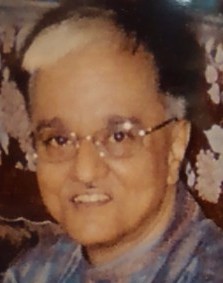Ajit Shukla
by Prateechee Shukla
Our father, Dr. Ajit Shukla, was a pathologist in the Indian Navy. Our earliest memory of him is as a very disciplined person, but also someone who doted on his family. He was extremely independent and liked doing things on his own – from polishing his shoes to getting his clothes ready for work. Our father did everything for his daughters, such as tying plaits in our hair or preparing dishes.
He always wanted his wife (Shailja) and daughters (Prateechee and Prachee) to be independent. I remember him saying, “I may not have a lot of money to pass on to you, but I can always give you a solid education that will support you throughout your lives.”
Our father retired from the defense services, but then struggled to establish himself in the private sector. I think this was also because he was so used to a regimented life in the Navy. Some of the happiest times for our family occurred while he was working in a senior post in a diagnostic lab. He was extremely meticulous in writing reports and keeping track of activities, but we started to see a change in his behavior. In early 2005, he took a job away from his family in Delhi, where he was tested to determine what was happening. The neurologist diagnosed him with Parkinson’s. I remember him telling us over the phone in a broken voice. He was our pillar of strength, and we had only heard him cry once before. In retrospect, for someone like him, just the idea of not being independent was disheartening.
His manager at the time told us he would be sending our father to work out of the Mumbai location so that he would be closer to family. Once he was back, small incidences started to occur – he withdrew money, but forgot his ATM card in the machine; often lost a lot of money; and banged the car against the parking lot while reversing. And then he would keep falling and even hurt himself seriously a few times. He started losing his balance while walking. One day he fell on the stairs at work and that time we took him to a different hospital. The doctor and even a psychiatrist there did not see any serious issues. The doctor changed his cholesterol, blood pressure, and other medications thinking this would help.
It was at this time we were referred to a neurologist who immediately diagnosed his illness as progressive supranuclear palsy, or PSP. In India there is absolutely no awareness of this disease, and there was only one specialist in the entire city who knew about it. We started looking up information on PSP. The neurologist told us there was no cure, but he did outline the progression. We searched on the Internet to see if there was anything about a cure in the United States or in Europe, but nothing came up.
Eventually our father started working half days, but due to his frequent falls, he was asked to leave the job. We soon realized that he could not be left alone and hired a caregiver who would be with him throughout the day. We also rallied around our father to care for him. My mother, my sister and I were all employed and saw the need to continue to work due to financial implications. Even at this point, we did not anticipate what this illness could do. We saw a complete change in his personality – he started being very stubborn and wanted to do everything on his own, which was getting increasingly difficult.
Next, he lost facial expressions and gradually lost mobility. There were times his gaze was fixed at a particular place. It looked like he was staring, but that was because his eye muscles were weak and he couldn’t move his eyes immediately. He lost the ability to chew food, and we had to grind his food and try to feed him. Many times he asked me to call my older sister who was married, and then asked her about his granddaughter. My sister did not have a baby then, but he still insisted on speaking to his granddaughter. Surprisingly, my sister had a baby girl after he passed away. We all feel she is gift from our late dad.
When we met with the neurologist, he confirmed that my father would probably not survive through the end of the year. He even let my sister know that there was no point in bringing him in for check-ups anymore. He then lost his ability to eat, and we had to insert a tube in his stomach. Every visit to the hospital was difficult because most doctors did not know about PSP. His other senses also degenerated, and he could hardly understand anything. It was the most difficult phase to see our dad like this. There were many times when he had to be rushed to the hospital. PSP changed him completely in three years.
In August 2008, he came down with a high fever, and we took him to the hospital where he was admitted to intensive care. He had now developed aspirational pneumonia and, because he had difficulty in coughing, a tube was inserted in his throat to help his breathing. During this time, I remember how he would lie in his bed, and we would sit with him and read the newspaper. I don’t know if he heard anything, but I just wanted him to know what was going on around him. On October 24, 2008, our father passed away after a lot of suffering.
We keep hoping that a cure will soon be found and that no family has to see a loved one suffer from this disease. We miss you dad.
